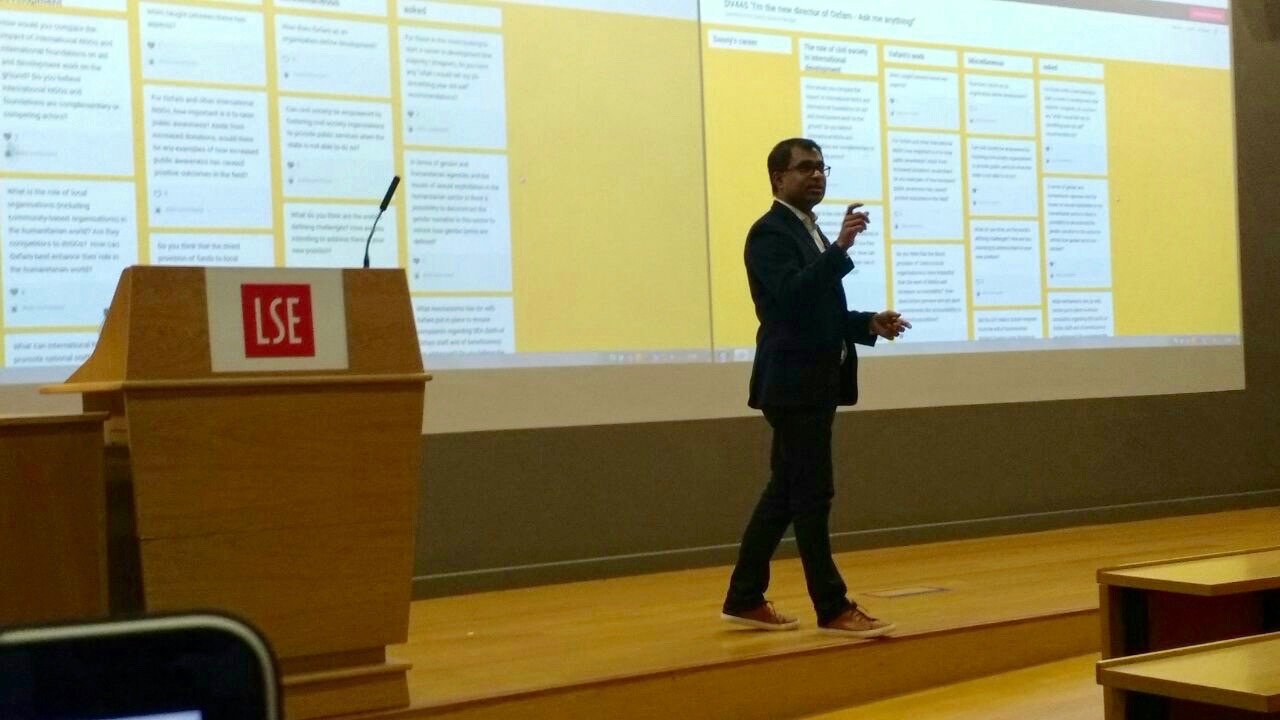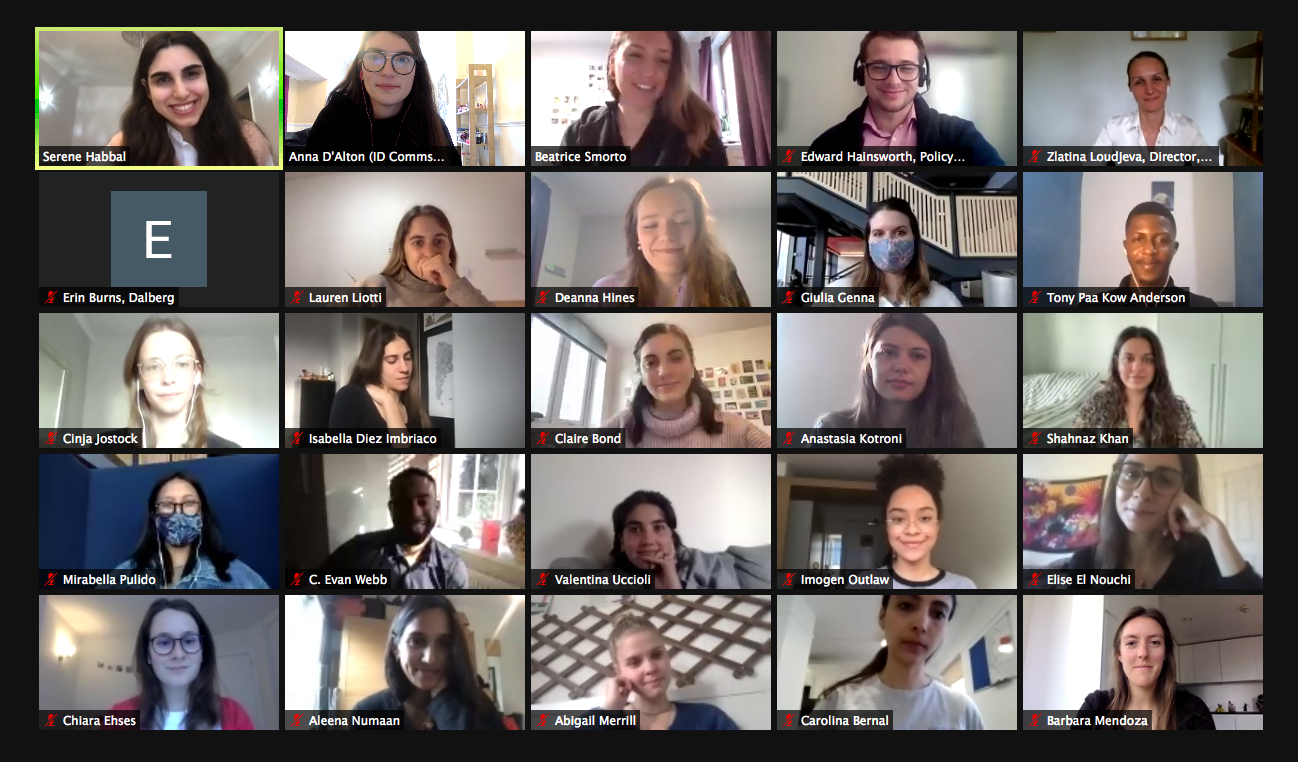On Friday 17 November, Stephanie Barrientos gave a lecture entitled ‘Gender and Work in Global Value Chains: Capturing the gains?’ as part of the Cutting Edge Issues in Development Lecture Series for 2023/24. The discussant for this lecture was Kate Meagher. Read what MSc students Danielle Dailey, Maddy Diment and JeongYeon Cho took away from the lecture below.
You can watch the lecture back on YouTube or listen to the podcast.
Odds are that within your wallet, you may have a loyalty card to your favourite supermarket. As Professor Stephanie Barrientos shared with the LSE community on Friday, these cards may share more information with retailers than you may know about yourself; from where you live, the size of your household, and even your drinking habits. Consumer activities of women are often central within retailers’ financial decisions, as they understand the power of women on the global economy. However, the role of women in the global value chain is less often thought of and valued. In her visit, Professor Barrientos shared the role of gender and work in global value chains.
The lack of transparency makes the data for feminization of employment within global value chains difficult to analyse as the data primarily exists only at the export level. Professor Barrientos shared with us just how extensive global value chains are, with the iPhone in your pocket made up of components from 26 countries. Historic deregulation of markets and the expanding accessibility of cheaper labour and goods lead to a market shift in the past 50 years that resulted in a massive increase in employment within value chain work around the world. This increase included many women, many who did not previously have paid work. With each segment of value chains embedded in local labour markets, men and women are both drawn into production in different ways.
In recent years, women working within global value chains were disproportionately impacted by the COVID-19 pandemic, when a number of multinational companies exercised their privilege and power to pivot production; cancelling nearly $40 billion of orders that were already in production and resulting in the loss of jobs for nearly a million garment workers; wreaking havoc on the factories, communities, and lives of those in the global value chain.
This upcoming holiday season, consumers will see many products out of the global value chain that undervalue women’s skills and contributions; benefiting the distributors rather than the producers. A global shift is needed for future changes in how women’s work is valued within global supply chains. While it is a work in progress, substantial improvements are needed within public regulation of value chains, increases in wages for factory workers, and improvements in gender outcomes in a system built on gender inequality.
Danielle Dailey
Global Value Chains describe the various stages involved in producing a good or service that is brought to the market. They form the basis of our daily life — without them, you could not read this article, have your morning coffee, or wear the clothes on your back. Last Friday’s lecture invited Professor Stephanie Barrientos and Professor Kate Meagher to outline how gender interacts with, and affects the formation of, Global Value Chains (GVCs).
The lecture centred on Barrientos’ book, ‘Gender and Work in Global Value Chains: Capturing the Gains’. Drawing on scholarship from economic geography and feminist political economy fields, Barrientos argued that gender inequalities are embedded within the structure of GVCs. Over the course of the event, three main topics emerged:
- Data
- Deregulation
- Downgrading
Data. Barrientos indicated that there is a dearth of data across GVCs since most data is collected at the import or export stage in a supply chain. The ‘missing middle’ that forms the interlinkages between import and export is underacknowledged. This makes understanding the scale and extent of gender inequalities in GVCs a perennial challenge.
Deregulation. GVCs emerged as a result of the deregulation of trade, finance and labour markets. Barrientos noted that while GVCs enabled greater female labour participation, improving agency and economic independence, they also laid the groundwork for the ‘second-shift’, where women face a double burden of employment and a disproportionate share of domestic responsibilities.
Downgrading. Price, speed and quality are the holy grail of GVCs. Multinational firms want low labour costs to meet tight price points, so they depend on outsourcing, contracting, and exploiting labour in lower-income countries. Under such conditions, women are made particularly vulnerable due to the downgrading of their skills, lack of coordinated labour organisation, and poor representation in leadership. Barrientos finished the lecture with a warning: better pay and conditions need to be fought for in GVCs – “the benign escalator view of Global Value Chains, where you get on the chain at the bottom and it’ll pull you up, does not exist”.
The future of GVCs is changing, in part due to shifting geopolitical relations, such as the relocation of production via ‘reshoring’, ‘nearshoring’ and ‘friendshoring’. Such shifts will impact women in varying and contrasting ways. As such, an intersectional approach is needed which considers how race, ethnicity, disability, income, class, and sexuality differently interact with GVCs. Analysing these relationships will lead to a salient understanding of how women might actually ‘capture the gains’ in global value chains, as well as the barriers that prevent them.
Maddy Diment
To begin with, Barrientos insists that the emergence of global value chains is linked with the commercialisation of reproductive work as well as the feminisation of employment. Traditionally, lots of the work done by women in the household is unpaid and undervalued compared with the work done by men. Even worse, in the example given of cocoa farms in Africa the work was mostly done by women, yet it was underrated compared to men’s work. However, after the emergence of the global value chains (GVCs), multinational corporations started to feminise employment as well as commercialised reproductive work.
Barrientos critiques the existing literature related to global value chains such as Global Value Chains, Global Production Networks and Feminist Political Economy since none of them precisely interpret the gendered aspects of the whole value chain. Therefore, she introduced a new analytical framework called Global (re)Production Network Framework. Through this framework, Barrientos brings up gender issues into the table of value chains. Moreover, she also critically examines whether joining the global value chain would be truly beneficial for women themselves by addressing both the benefits and drawbacks of GVCs.
There are also several contemporary challenges that Barrientos emphasises, such as COVID-19, innovation and technology, and geo-political tensions. Specifically, COVID-19 has deteriorated the visibility of women since women’s work is still highly undervalued, temporal and vulnerable. She also highlights the importance of working on data related to gender issues, since there is a lack of data to analyse across GVCs. Barrientos concludes the lecture by saying regulations and policies to address gender equality are significantly crucial, especially for minorities’ rights. Through this lecture, I could see and think about the drawbacks of GVCs which even the World Bank did not mention clearly in their report to promote GVCs’ advantages to low and middle income countries based on the neoliberalism perspective. It was also a meaningful opportunity to remind myself why gender lenses should be on the table of politics, especially as a student of International Development and a South Korean, a country which has recorded the highest gender pay gap among OECD countries for more than 25 years.
JeongYeon Cho
The views expressed in this post are those of the author and in no way reflect those of the International Development LSE blog or the London School of Economics and Political Science.





